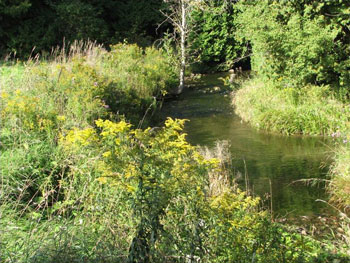ARCHIVE EQUINE NEWS STORIES
| Current news is available at TheHorsePortal.ca, Equine Guelph's online learning platform for practical, quick learning. Given the vast amount of information on horse health and welfare, Equine Guelph has archived its past news articles from 2002-2020. They are listed below, along with a search function available to find specific healthcare topics. | |
Would you like to Reduce your Environmental Hoof-Print?March 2010
By Mark Eastman, Credit Valley Conservation Authority
 Have you ever wondered how your equine operation may be negatively impacting the natural environment? Have you considered making improvements on your property like fencing along streams and ponds, planting trees for windbreaks or habitat enhancement, or; constructing a new manure storage, but are concerned about the cost?
Have you ever wondered how your equine operation may be negatively impacting the natural environment? Have you considered making improvements on your property like fencing along streams and ponds, planting trees for windbreaks or habitat enhancement, or; constructing a new manure storage, but are concerned about the cost?
If you have answered yes to the above questions, then consider attending a free Environmental Farm Plan Workshop. Environmental Farm Plan workshops are delivered by local Ontario Soil and Crop Improvement Association representatives to assist participants with the completion of worksheets which assess the level of your operation’s environmental risk.
- Some examples of the categories addressed in the plan, include:
• manure storage and handling,
• stream, ditch and floodplain management,
• wetland, woodlands and wildlife management
Once the worksheets are complete, the landowner creates an action plan to identify land management improvement opportunities and priorities on the property. In addition, the action plan highlights how the improvements are to be made. Once the action plan is complete, it is reviewed by a committee, made up of local peers. If the plan is accepted by the peer review committee, you may proceed with implementing one or several projects of your choice to reduce the environmental risk of your operation.
In an effort to assist you with the cost of implementing your environmental improvement projects, your local Ontario Soil and Crop Improvement Association will inform you about funding available through the Canada-Ontario Farm Stewardship Program. Traditionally, only farms which possessed valid farm business registration numbers were eligible for the Canada-Ontario Farm Stewardship Program funding. This excluded many smaller equine operations that did not view themselves as farm businesses and did not generate greater than $7,000 of gross income from the operation. However, the eligibility criteria for the Canada-Ontario Farm Stewardship Program has recently changed and a valid farm business registration number is no longer a requirement. Now, small equine operations can simply submit a copy of their Property Assessment Notice from the Municipal Property Assessment Corporation (MPAC), confirming the property is classified as “Farm Taxable: Full.” You will also need to provide proof of individual membership in the one of the following farm organizations, Ontario Federation of Agriculture, Christian Farmers Federation of Ontario or National Farmers Union-Ontario.
If your property is not currently classified as agricultural or you are not a registered member in one of the three general farm organizations, you have options. For properties zoned agricultural, including all subclasses (i.e. rural or small agricultural holdings) that engage in agricultural activity, and this includes raising and maintaining horses, it is possible to have the classification of at least a portion of your property changed from commercial or rural residential to agricultural, by submitting a Request for Reconsideration to MPAC. For more information on this process contact MPAC by calling 1 866-296-6722.
To enroll yourself as an individual member in one of the three general farm organizations, contact them at the telephone numbers provided below:
Ontario Federation of Agriculture: 1 800 668-3276
Christian Farmers Federation of Ontario: 519-837-1620
National Farmers Union: 306-652-9465
Please note that individual memberships do not provide RST exemption. Only property owners who gross greater than $7,000 of farm income annually and have a valid farm business registration number are eligible for RST exemption.
There are a number of other programs that can help you implement your approved Environmental Farm Plan too. Contact your local Conservation Authority for details on technical and financial grant opportunities. Not sure which of the 36 Conservation Authorities you should contact, check out the provincial map and contact listing on the Conservation Ontario website
This article has been prepared by the Healthy Lands for Healthy Horses Steering Committee, which is comprised of representatives from the Ontario Equestrian Federation’s Horse Facilities Council, Uxbridge Horseman’s Association, Ontario Trail Riders Association, Equine Guelph, University of Guelph, Ontario Ministry of Agriculture, Food and Rural Affairs and various Conservation Authorities.
The steering committee will be hosting a two day natural environment and equine workshop in Caledon on March 27th and April 10th. Funding for this workshop has been provided by the Ontario Soil and Crop Improvement Association from the Nutrient Management BMP Demonstration Grant funding project. Participants will have a chance to complete an environmental risk assessment for their operation and learn from others who have made environmental improvements to their operations.
Interested? call 905 670 1615, ext 221
For more information please visit: www.equineguelph.ca/healthylands.php